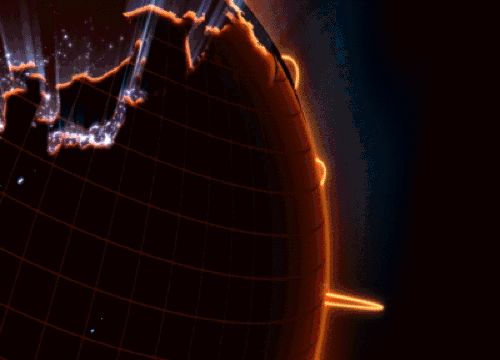Civilization at a Crossroads: The Choice is Decentralization or Extinction
Many people don’t understand the real purpose behind bitcoin. I was the same way when I first heard about it a few years ago. I thought it was just another Paypal, but a little over a year ago I read the white paper and it turned out to be the beginning of one of the deepest rabbit holes I’ve ever gone into. Since that time, I’ve listened to practically all of Andreas Antonopoulos YouTube videos on the subject of bitcoin and enrolled in Ivan OnTech’s Blockchain Academy. I’ve been a programmer for over 2 decades and soon will be in Ivan’s blockchain coding class.
Nobody in the mainstream media is doing their job either on informing the public that there’s now a solution to the growing problem of terrorism. They likely don't even understand why it's happening. The authorities cannot recognize the technology that underlies bitcoin as forming the solution because their survival depends upon their not understanding the problem. The lesson is that control is what produces terror and centralization of control makes it worse. Terrorism is the shadow side of authority. The more authority and control there is, the worse the problem of terrorism will get.

source
We’ve not been good at identifying the problem because the problem is us. Nobody wants to relinquish control. But the evolution of our species has reached the point that loss of control is exactly what is needed to preserve the future of the planet. We can no longer count on the whims of politicians to guide policy. They are making dangerous mistakes. Eventually the Trump’s, Putin’s and Kim Jong Un’s of the world will make a fatal mistake that everyone will pay for with their lives if centralization of power continues.
We’ve reached this crossroads because technology has outpaced human ability to keep up. The legal system is lagging behind, far behind technology’s ability to surpass the Aristotelian model of causation and legal recourse. Human’s were capable of running the world as it existed a hundred years ago. It wasn’t that far over their heads at that time. But no one can comprehend the vastness of the code that exists out there in cyberspace, and all of the consequences it brings with it. IoT will eventually introduce an AI singularity. Putting one person in charge of all of that is foolish, and those who think they can handle it suffer from hubris. Such technology should run through consensus algorithms so that the laws of nature can balance out human mistakes.
The Last President

source
The office of president has become obsolete. The idea of a world emperor controlling everything is an idea whose time has passed. Our failure to adapt to this new reality will lead to our extinction. What should replace the decision making of a president is the rules of consensus. We will probably need one last president to oversee the dismantling of government institutions that will be replaced with localization and reparations of the damages done to the people.
Nature has existed for billions of years following the consensus rules of DNA and physics. But no human government has survived much more than a few hundred years before fracturing into something disastrous. This wasn't a problem when the most advanced technology was the wheel, but now we’re lucky if only a few selfishly profit while everyone else suffers.
No Control Means No Blame

source
The signs are already out there for everyone to see. Whenever some authority has control, such as Mark Zuckerberg, they become a target. Now he’s being called in front of congress to testify. Should he be in control? Who gave him that right? Decentralization makes such blame impossible to establish because all such events are simply part of the mathematical nature of the blockchain.
Don’t like it? Then the other option is to not participate. This is the nature of voluntary systems. Government likes to encourage irresponsibility so that blame can be shifted away from the legitimate source of the problem onto something irrelevant. The truth is you probably didn’t care that your data got mishandled by Facebook, but in the quest for control, someone sought to use this to their political advantage. It’s time to close those loopholes with decentralization.
Power Corrupts and Centralization of Power Corrupts Absolutely

source
Look at the recent case of the woman who shot several people working at YouTube. Centralization allows us to play the blame game. The threat of blame becomes the leverage of blackmail which then becomes the compromised position of authority. Then that authority falls and is replaced, still with the same flaws as before and somehow we expect a different result. Are we really that stupid? If so, why do humans insist on remaining in control when something better can replace them?
One of the keys to reducing terrorism is to decentralize all forms of institutional power. Whether it be Al-Queda, ISIL, Iran, North Korea or the USA, all of these institutional forms of power generate terror. For those who say that the USA is not a terrorist organization, I’ll remind you that King George of England called George Washington a terrorist. Terrorism is simply the weaker authorities attempt at control. This is why if you eliminate control, you eliminate terrorism and also blame.
The Code underlying Bitcoin Solves the Problem of Authority

source
This is what most people aren't aware of yet. The trend that began in the middle of the 20th century with middle class jobs being replaced by automation through computing finally reached the highest level. In the past, the only solution to the Byzantine generals problem was the use of a central authority. This required hierarchy. Bitcoin eliminates the use of central authority. It can't be shut down the way Zuckerberg could because there is nobody in control.
When this same technology is applied to political and legal systems in the future, that's when politicians will be out of a job. Representation will no longer be necessary because we can simply present (not re-present) our own will on a flat network. Through the applicability of voluntarist principles that honor scope (property), political agendas that arise have to achieve a certain level of consensus first before they achieve elevation. Agenda's that violate the issue of scope or property will not get elevated unless great harm could be done. This too can be achieved by consensus using mathematical certainty rather than the uncertain political whim of a despot. Which would you prefer?
Donations (public bitcoin address):

3FwxQsa7gmQ7c1GXJyvDTqmT6CM3mMEgcv

I used to think that decentralization will succeed, but I'm not so sure anymore. It seems even these so-called decentralized systems eventually start to centralize at some point in their lifespan.
As for the governments, I doubt they go down without a massive fight. We won't win with clean hands, I'm afraid.
Civilization does hard crashes because civilization is based upon hierarchy. There will always be some wobble in the balance between centralization and decentralization.
Hierarchies aren't automatically unstable. You alluded to this with "wobble in the balance between centralization and decentralization". A baboon troupe has a hierarchical social structure that works well for them. Though hierarchies in human affairs have a way of becoming unstable. I think that it's because they attract the most alpha of the alpha males among us. A hierarchy is easy to corrupt and strong willed, egotistical, self interested person sitting at the apex is almost a guarantee of a bad outcome over the long term.
Compared to what? I'm making a comparison to nature itself which has managed with flat systems for millions of years. We have yet to have a government last more than a few hundred years. That's extremely unstable. If you want to say that a government like the USA has lasted 250 years and that's pretty good, your standards are too low. Civilization cannot last with that level of instability. This is why they crash hard.
As for the "wobble", I'm actually drawing a bit on esoteric knowledge that you'll find in Plato's Timaeus and the Same and Other dialogues. Some in the east know this as Yin / Yang. There will always be a battle between light and dark in this realm, but we haven't learned from nature yet how to resolve this dilemma. Nature has solved this problem with flat systems such as DNA structures that have no central authority. It has embedded within it, its own consensus algorithms.
There are hierarchical structures in nature. The alpha males in wolf packs and primate troupes are good examples. Seems to me that nature itself gravitates towards that which works best for any particular niche. Flat, decentralized structures have great utility in many applications. Hierarchical systems also have their uses.
I'm not saying that all hierarchical systems are bad. I use one in the Terran Atlas central database that I programmed. It isn't a distributed database using consensus algorithms.
You probably haven't read the rest of my blog on this subject which is rather long, but I talk about the unnatural accumulation of wealth and that this extreme centralization is a danger to the planet and that bitcoin which disallows inflationary measures prevents annihilation through excessive cost.
The goal here isn't the cure of the human condition. It's the restraining of the central impulses that will eventually given enough time lead to nuclear annihilation. Multisig found in smart contracts can fix this problem.
I think we agree in general. Decentralized control systems via blockchain will disrupt a lot of traditional methods. It will be interesting to watch it happen.
It would be nice if there was more disagreement in general in the population. There are far too many followers in agreement with a central authority. Had there been a bit more of this in the general population, maybe authority wouldn't have amassed so much wealth and destruction potential.
I think the problem is not hierarchy but unquestioned authority. And this authority then leads in consequence to a hierarchical and flawed systems.
There is for example nothing wrong when companies internally use a hierarchical structure or a baboon tribe does that. In both cases there is no unwarranted trust placed into the leaders. The company has to compete on the free markets and the baboon leader is constantly challenged by rivals.
But we trust our government and these power structures are not under pressure. We believe their stories and follow their laws. This is what makes it possible to get a deeply corrupted and hierarchical structure that is never found in nature and that is also very unstable.
Moment ago I came across your other post and I really liked it. It seem that you're really hate centralization and see decentralization as a solution to our problems. Or am I wrong?
Just checked your profile just to realize that we seem to share a number of interests :)
In particular that we both share a similar passion towards cryptocurrencies and blockchain technology :)
Thx for that quite informative post. Keep up with creating interesting content.
I had to read your post again.
Really amazing piece of work. You really fell into that rabbit hole :)
Another fascination post! I really like how you liaise different dimensions in tech, politics, history. I draw different conclusions maybe, but your thoughts are inspiring!
Technology does not fix human corruptibility. At best it constrains it. Nor is decentralization the best model for all situations. A good example is the contentiousness SegWit brought to the Bitcoin community. The problem of transaction throughput is critical but the amount of heat and hostility generated before the community came to consensus served no good purpose. Flat, decentralized structures are good for exploring new and complex information spaces and for surfacing a wide range of potential solutions. But when a quick reaction is required, waiting for consensus across a large network can be catastrophic.
Of course it doesn't, but that's not the goal here. The goal is to prevent extinction.
It's quite true about consensus algorithms not being good for everything. This is why I brought up the scope issue near the bottom. I know I didn't fully explain that part. But there will always be someone in control when it comes to the individual. Consensus wouldn't be part of that decision making process. Consensus wouldn't be part of ones decision making when it comes to ones own property. For instance, we wouldn't take a vote on whether everyone in our community should be entitled to 10% of what's in your wallet (government however does this quite regularly).
Quick reactions are required by individuals, but they are not required by large groups. The excuse typically given is that quick reaction would be needed sometime to avert disaster. This of course is a disaster probably instigated by another authority (such as war by another country). Eliminate that, and what kinds of disasters are left? Getting struck by an asteroid? Hurricanes, tornado's, etc are all things individuals can cope with quickly. We don't need a consensus for that.
Im thinking about joining Ivans class too.
Would you be kind to drop me an email: [email protected] as I would love to keep in touch with you?
Yours
Piotr
Thanks for the info.
It's hard for me to retrain now. I spent all my life in the sea and received a penny - it was hard to live.
Democratize the workplace!
Good written piece